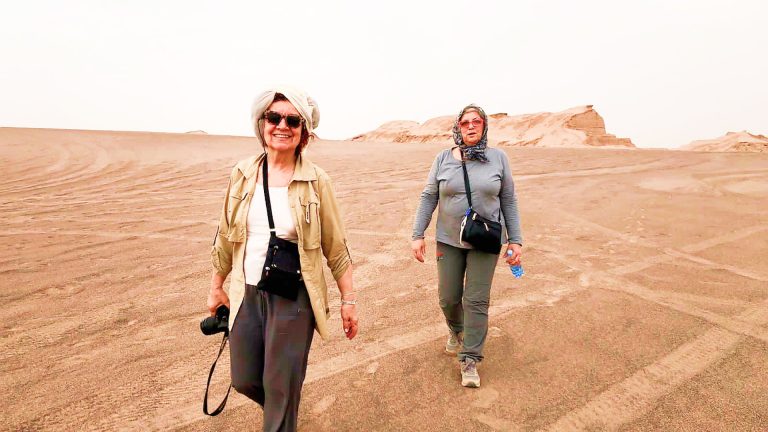The process of making rose water in Iran is not a festival or event, but rather a traditional practice that has been passed down for generations. However, the collection of rose petals and the production of rose water is often celebrated during the Rose Water Festival in Kashan, Iran, which takes place annually in May.
During this festival, locals and tourists can participate in the process of collecting rose petals, as well as enjoy traditional food, music, and other cultural activities.
This festival, which is also known as Golabgiri or Golabshanasi is celebrated every year in Iran during May or early June when the blooming season of Damask roses reaches its peak.
During this festival, thousands of people gather in cities like Kashan to witness the process of extracting rose water from the petals of these fragrant flowers. The festival offers a unique opportunity to experience the rich cultural heritage of Iran and to enjoy the beauty and aroma of one of the world’s most beloved flowers.
What is Rose Water?
Rose water is a popular ingredient in many cultures, and it is often used in festivals and celebrations around the world. One of the most well-known rose water festivals is the Rose Water Festival in Kashan, Iran. During this festival, which takes place in May, locals gather to celebrate the blooming of the city’s many rose gardens. Visitors can watch as rose petals are collected and used to make rose water, which is then used in cooking, as a perfume, and in traditional medicine.
In India, rose water is an important part of many Hindu ceremonies and is used to adorn deities and bathe sacred objects. In Morocco, rose water is used in the traditional hammam bath to cleanse and rejuvenate the skin. All around the world, rose water is celebrated for its beautiful fragrance and many beneficial properties.
The process of making rose water can vary from country to country and even from region to region.
Making rose water around the world
In Iran, for example, the traditional method of making rose water involves boiling rose petals in water and collecting the steam that rises from the pot. This steam is then condensed to create rose water. This process is known as the distillation method and is considered to be the most traditional and authentic method of making rose water.
On the other hand, in some countries, such as India and Morocco, rose petals are often soaked in water and left to sit for a period of time, allowing the water to soak up the fragrance and beneficial properties of the rose. This method is known as the infusion method and is often used for making rose water in these countries.
Additionally, the types of roses used to make rose water can differ between countries. In Iran, the special Damask rose, which is famous for its fragrance, is used for making rose water.
In India, on the other hand, the Kannauj rose, also known for its fragrance, is often used. Overall, while the process of making rose water can differ between countries, the end result is a fragrant and useful product that is cherished all around the world.
If rose water is one of the products of your city and country, we will be very happy if you update our information about this. For many years, one of the souvenirs that our dear Bulgarian tourists brought to Iran is products made of rose water, such as creams, essential oils, scented candles, etc. And this shows the importance of rose water and its compounds in different countries.
Which type of roses are used to make rose water in Iran?
Damask roses, also known as Mohammadi flowers, are one of the most fragrant types of roses that grow in many parts of Iran. They are cultivated mainly in the foothills and arid and semi-arid regions with mild, dry summers and cold winters.
The primary products derived from Damask roses in Iran are rose water, essence, and dried petals, which are widely used in pharmaceuticals, perfumes, cosmetics, and food industries. The sweet scent and flavor of Damask roses make them a popular ingredient in many Iranian dishes, sweets, and drinks. In addition to their aromatic qualities, Damask roses are also known for their health benefits.
Rose water and rose oil, extracted from the petals, are believed to have anti-inflammatory, anti-bacterial, and calming properties and are used in traditional medicine and aromatherapy.
Overall, Damask roses are a significant part of Iran’s cultural heritage and economy, and their distinct aroma and flavor continue to captivate people around the world.
The Role of rose water in Ancient Persian Poetry
Harvesting Damask roses and making rose water (Golab) is a ritual deeply ingrained in Iranian culture. This 1000-year-old tradition has remained largely unchanged over time. Rose water, or Golab, not only holds a prominent physical presence in the Iranian market and across the world but has also captured the attention of Iranian poets. The word “Golab” appears frequently in ancient Persian poetry, which is often scented with the fragrance of these delicate roses.
“When the flower has passed and the garden is in ruins,
where shall we find the fragrance of the flower but in the rosewater?”
In this verse, Rumi cleverly employs the metaphor of the rose and rosewater to allude to the story of selecting Jesus’ successor after his ascension.
Where you can be the witness of rose water process in Iran
If you’re interested in witnessing the rosewater-making process firsthand, Iran is the place to be. May is the best month to visit as it marks the time when the Iranian damask roses are fully matured and ready to be harvested. To experience the enchanting rosewater ritual, head to one of the 14 provinces where the ceremony is held annually. The specific location varies based on the weather and climate of the area.
To catch the beginning of the Rose watering ritual, head to Meymand in Fars province. The enchanting harvesting rituals and the mesmerizing Rose watering process attract millions of tourists every year.
Where does the best rose water in Iran come from
Kashan and surrounding cities like Qamsar and Niasar are the best place to attend this fragrant festival. It’s fascinating to note that the Kashan workshops produce a staggering fifteen thousand tons of rose water annually, making this city one of the biggest producers in the world.
Qamsar’s rose water is renowned for its exceptional quality and is considered to be one of the best in the world. Situated 40 km away from Kashan, Qamsar attracts numerous tourists every year who visit the city to witness the Rose watering process firsthand. In addition to its exceptional quality, Qamsar’s rose water is also highly revered for its religious significance.
It is frequently used to flavor Muslim shrines, including the holy shrine of Imam Reza in Mashhad.
Get familiar with the process of making rosewater
The harvesting process begins in the early morning when the flowers are hand-picked with great care. Most of the rural houses in Qamsar have Mohammadi flower gardens and special boilers to aid in the distillation of the rosewater.
It’s interesting to note that in the past, the ceremony was accompanied by musical performances on traditional instruments. Although this is no longer practiced in many places, you can still find some areas where this ancient custom is upheld.
The Rose watering process begins with the harvested roses being transferred to distillation workshops. Once you arrive at the workshop, you can follow the process from start to finish. To help you cool off and relax, a refreshing cold drink is prepared for you on arrival. As the ceremony begins, the participants gather around the pot filled with roses and carry it to the riverside.
Here, they sing religious prayers and prepare to start the distillation process by lighting a special stove. The aroma of the roses fills the air as the steam begins to rise and the rosewater-making process commences.
Due to the size of the boilers, the fresh roses are mixed with water at a ratio of 1:3. The pot is then covered with the boilers, and the opening holes are sealed to ensure that the steam remains completely inside the boiler.
The distillation process typically takes around 4 hours to complete. Once the contents of the boiler have boiled, the steam is channeled through pipes into a large copper pitcher, which is then immersed in cold water.
As the vapors cool, they begin to condense, resulting in the production of precious rose water. Once the distillation process is complete, the pitchers yield around 30-40 liters of rosewater, depending on their capacity.
To ensure the highest quality, a thin layer of oil is separated from the rose water container using a syringe, which captures the concentrated essence of the roses.
After witnessing the enchanting Rose watering process, visitors have the opportunity to purchase a bottle of rose water or other products produced by these workshops.
The way you can follow your rose water journey
If you’re traveling to Niasar, a small city 24 km. in the northwest of Kashan, to attend the Rose watering ceremony, make sure to spend some time exploring the breathtaking natural scenery in the area.
With its pristine natural beauty, Niasar is the perfect place to relax and unwind after experiencing the mesmerizing Rose watering process, besides attending the event. Niasar Waterfall is a well-known attraction among tourists and visitors.
Nestled in the heart of the mountains, this magnificent waterfall is truly a sight to behold. In addition to the waterfall, Niasar has other sights to offer, including the Chahar Taqi and the cave, which is considered a shrine.
The Niasar Cave is another fascinating attraction that is both residential and protective in nature. The cave extends for about 100 kilometers, and at the end of the cave, the height is decreased. Visitors can explore the cave and marvel at its unique geological formations while learning about its rich history and significance.
The stream that originates from the Chahar Taqi passes along the cave, creating a breathtaking landscape. The sound of the flowing water adds to the natural beauty of the area and makes for a peaceful and relaxing environment.
We can take you to Kashan from all the cities of Iran to participate in the Golab Giri (rose water) festival so that in addition to visiting the attractions of Kashan, you can also witness this fragrant festival.
In May, attending the rose water Festival is always an inseparable part of our tours.
Contact us for more information.


